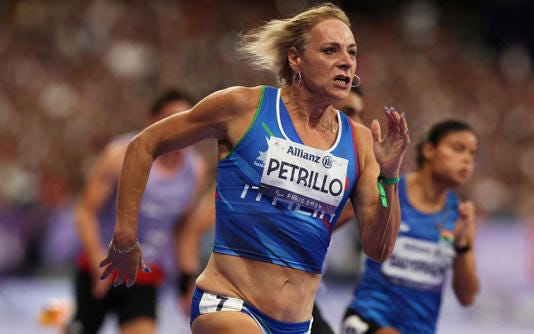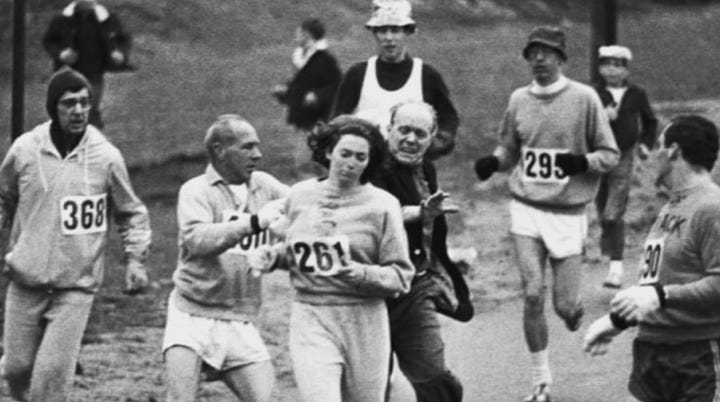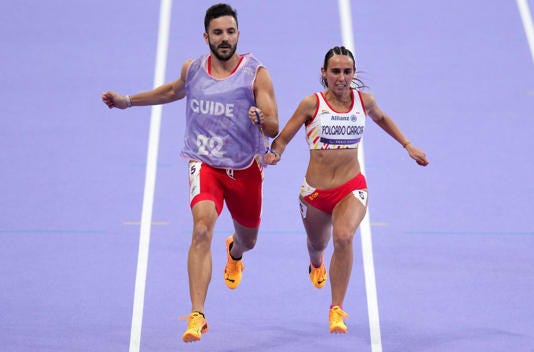Women need to fight back
"Trans" dad Petrillo, who beat two women half his age at the Paralympics, to win a bronze medal, has made it his mission to start an "inclusion revolution".


The Paralympics have now joined the Olympics in making a mockery of women’s sports. What women fought so hard to achieve is being trampled underfoot.
One-time or recurring donations can be made at Ko-Fi
In the Paralympics, visually impaired Valentina Petrillo, a 51-year-old father-of-two, has taken semi-final places in female sprinting from two women barely half his age. This is just the latest in a series of broken dreams this “trans” dad has left behind him. At last year’s World Championships, he stole two bronze medals in the 200m and 400m race for visually impaired women.
Petrillo, who up until the age of 45 competed as a man, has now declared it’s his ambition to start an “inclusion revolution”. Yes, include everybody (men)—even if it means excluding women from their own category.
For Spain’s Nagore Folgado Garcia, who is blind in one eye and can only see three feet in front of her in the other, due to a rare form of cancer attacking her retina as a child, this has meant losing her place as a paralympic medal winner.

Instead of being embarrassed and promising to correct this flagrant injustice, Andrew Parsons, president of the International Paralympic Committee, joyfully declared, “When it comes to transgender athletes, they are breaking barriers everywhere. I remember a couple of years ago, saying to our board, ‘Look, it’s not a matter of if, it’s a matter of when.’”
I think back to Katherine Switzer, who in 1967, became the first woman participant of the Boston Marathon. Since no woman had ever run in the Boston Marathon at the time, Switzer had registered under the name “K.V. Switzer,” in order to mask her gender from potential disqualification. For two miles of the race, she was able to run, undetected. However, at the two-mile point, a race official named Jock Semple recognized that she was a woman. Enraged, he chased Switzer, threw her back and yelled, ‘Get the hell out of my race!’
Switzer’s boyfriend fought off Semple and despite his hatred and that of the journalists who yelled obscenities towards her, Switzer finished the race.
Switzer never stopped running and by April 18, 2017, fifty years after the 1967 Boston Marathon, she had completed 39 races.
Her message to young girls has always been, “You can do more than you can ever imagine. The only way you can imagine it is to do it. To take the first step. And if you take the first step, you can than take three steps. And then you can take 10. And someday maybe you can run a marathon. And if you can run a marathon, you can do anything.”
Except, you can’t tell that to young girls any longer. What you have to say is, Look, when all the other girls are going out on dates and having fun, you can sacrifice all you want, put your heart and soul into achieving your dreams, train harder and better than any other girl, but it doesn’t mean you will win. Some guy who decides he is a girl can come along and steal everything from you.
But no one should ever have to tell this to a young girl.
People always say women and girls need to fight back. Why don’t more of them refuse to compete under these conditions? But the thing is, this attitude of giving in starts when they are children. Girls should not have to defend themselves. They should have the example of adults fighting for them. They should know early on that their parents and their coaches believe they are worth fighting for. Only then will they grow up with the confidence to defend themselves, knowing they are backed by people who always believed in them. If this were the case, we wouldn’t be where we are today.
Almost 60 years after Switzer’s triumph, we should not be right back to men telling women and girls, “Get the hell out of my race.”




Riley Gaines is a great example of dignity and courage in the face of these despicable insults to justice!🗽
I am like a parrot repeating to any woman who seems at least a little open about Herbert Marcuse stating in an interview that being a woman is a social construct but believed our feminine wiles (I assume compassion/inclusion) would prove useful. That seemingly innocuous interview with BBC's Bryan Magee was like the magic key that helped me make sense of things. If you convince women that we are only a social construct, everything we do that is unique to us - such as giving birth - seems like a burden that needs to be excised from our consciousness. Add to this Simone Beauvoir's belief that one becomes a woman, and you see the trail that leads to men competing as women. I believe it is by design by the Neo-Marxists. You have to erase women's desire to ensure human flourishing, whether one is a celibate nun working with families or a woman with children, to bring forth the post-human condition. As for our biological magnificence, a CHD presenter referenced how a mother's breast milk will change in response to a child's ill health. That isn't magical thinking or alchemy. That is our gift.